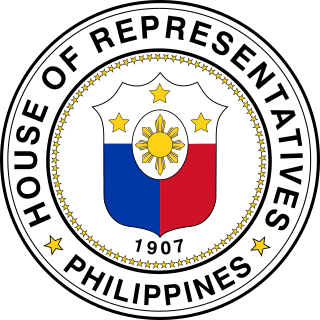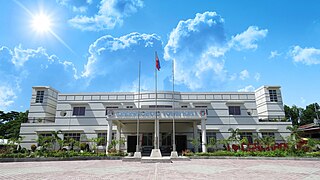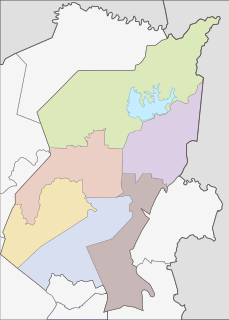
Cagayan Valley, designated as Region II, is an administrative region in the Philippines, located in northeastern section of Luzon Island. It is composed of five Philippine provinces: Batanes, Cagayan, Isabela, Nueva Vizcaya, and Quirino. The region hosts four chartered cities of Cauayan, Ilagan, Santiago, and Tuguegarao.

Nueva Vizcaya is a province of the Philippines located in the region of Cagayan Valley in Luzon. Its capital is Bayombong. It is bordered by Benguet to the west, Ifugao to the north, Isabela to the northeast, Quirino to the east, Aurora to the southeast, Nueva Ecija to the south, and Pangasinan to the southwest. Quirino province was created from Nueva Vizcaya in 1966.

Quirino is a landlocked province in the Philippines located in the Cagayan Valley region in Luzon and named after Elpidio Quirino, the sixth President of the Philippines. Its capital is Cabarroguis.

The House of Representatives of the Philippines is the lower house of the Congress of the Philippines. It is commonly referred to as Congress and informally referred to as the Cámara or Kamara.

Cabarroguis, officially the Municipality of Cabarroguis, is a 3rd class municipality and capital of the province of Quirino, Philippines. According to the 2015 census, it has a population of 30,582 people.

Saguday, officially the Municipality of Saguday, is a 5th class municipality in the province of Quirino, Philippines. According to the 2015 census, it has a population of 16,070 people.

The legislative district of Mindanao and Sulu was the collective representation of the Department of Mindanao and Sulu and its component provinces of Agusan, Bukidnon, Cotabato, Davao, Lanao, Sulu and Zamboanga as a single at-large district in the lower house of the Philippine Legislature from 1916 until 1935.

The legislative districts of Quezon City are the representations of the highly urbanized city of Quezon in the various national legislatures of the Philippines. The city is currently represented in the lower house of the Congress of the Philippines through its first, second, third, fourth, fifth, and sixth congressional districts.
The legislative district of Basilan is the representation of the province of Basilan in the various national legislatures of the Philippines. The province is currently represented in the lower house of the Congress of the Philippines through its lone congressional district.
The legislative district of Camiguin is the representation of the province of Camiguin in the various national legislatures of the Philippines. The province is currently represented in the lower house of the Congress of the Philippines through its lone congressional district.
The legislative districts of Ilocos Sur are the representations of the province of Ilocos Sur in the various national legislatures of the Philippines. The province is currently represented in the lower house of the Congress of the Philippines through its first and second congressional districts.
The legislative districts of Zamboanga del Sur are the representations of the province of Zamboanga del Sur in the various national legislatures of the Philippines. The province is currently represented in the lower house of the Congress of the Philippines through its first and second congressional districts.
The legislative district of Davao del Sur is the representation of the province of Davao del Sur in the various national legislatures of the Philippines. The province is currently represented in the lower house of the Congress of the Philippines through its lone congressional district.

The legislative districts of Sultan Kudarat are the representations of the province of Sultan Kudarat in the various national legislatures of the Philippines. The province is currently represented in the lower house of the Congress of the Philippines through its first and second congressional districts.
The legislative districts of Zambales are the representations of the province of Zambales and the highly urbanized city of Olongapo in the various national legislatures of the Philippines. The province and the city are currently represented in the lower house of the Congress of the Philippines through their first and second congressional districts.
The legislative districts of Isabela are the representations of the province of Isabela and the independent component city of Santiago in the various national legislatures of the Philippines. The province and the city are currently represented in the lower house of the Congress of the Philippines through their first, second, third, fourth, fifth, and sixth congressional districts.
The legislative district of Nueva Vizcaya is the representation of the province of Nueva Vizcaya in the various national legislatures of the Philippines. The province is currently represented in the lower house of the Congress of the Philippines through its lone congressional district.
The legislative district of Calamba is the representation of the component city of Calamba in the Congress of the Philippines. The city is currently represented in the lower house of the Congress through its lone congressional district.

Nueva Vizcaya's at-large congressional district, also known as Nueva Vizcaya's lone district, is the sole congressional district of the Philippines in the province of Nueva Vizcaya for various national legislatures since 1898. The province first elected its representative provincewide at-large for the Malolos Congress of the First Philippine Republic. In 1907 when the Philippine Assembly was established, the province had no representation as it then included parts of non-Christian tribelands. Since 1916 when it was re-established as a specially organized province separate from its former Comandancia de Quiañgan which became the Ifugao sub-province under Jones Law, Nueva Vizcaya has been entitled to one member in the House of Representatives. It remains as a single-member district, except for a brief period between 1943 and 1944 when a second seat was allocated in the National Assembly of the Second Philippine Republic.










